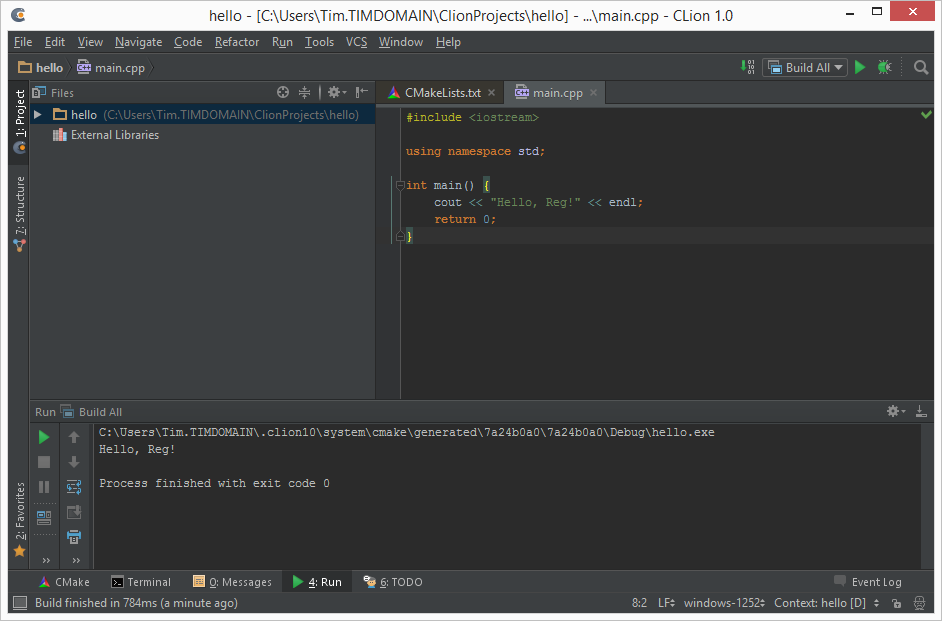
We can choose the debugger that IntelliJ rust will use:
CLION CYGWIN HOW TO
Now that we know how to check variables step by step, let’s stop the session and review the settings. In this case, “forced entry” will jump directly to disassembly:
CLION CYGWIN CODE
The latter is useful when we want to enter a function whose source code is not accessible.
CLION CYGWIN WINDOWS
In fact, we don’t have to drill down into the variables pane in each step, because these values are also displayed inline with the variables:Īt the top of the debug window, we have some step-by-step buttons, such as step over (F8), step into (F7) and force step into (Shift + Alt + F7 on Windows / Linux and ⇧⌥ F7 on MacOS). We can search by right clicking in this pane, and then expand the child nodes of the data structure. On the right, we have variables in the current range. It is organized around stack traces and threads: we can switch from one thread to another, and then move frames up and down. When our test reaches the first breakpoint, the “debug” window will pop up automatically.

The plug-in will call cargo testTo get the unoptimized binary with debugging information and start it under the debugger. Let’s select a test to debug, place several breakpoints in the code, and then click the debug icon next to the test name: If we want to debug a test or target without input parameters, the quickest way is to use the shortcut menu. If you are using mingw64, it should be x86_ 64-pc-windows-gnu。 You can run the command rustup default To set the appropriate tool chain.
CLION CYGWIN PC
For example, if you are using MinGW (32-bit), the default toolchain should be i686 PC Windows GNU.

Then, run the command rustup toolchain listAnd check the first line: it should be one of the GNU versions that matches the number of bits of the debugger. On windows, go to settings build, execution, deployment toolchain and Cygwin or MinGWSet as your work environment. If indexing is complete and the cargo tool window shows all the modules and targets in the workspace, you are fully loaded.

If you want more information, please move to the of the trust plug-in quick tour And clion’s Web application debugging。 Before startingįirst, make sure your project is fully loaded.

In this article, we’ll take a closer look at what the clion plug-in needs to do when debugging a rust application.įirst, we’ll go directly to the debug session to learn the basics, and then explore debugger settings and other options in detail. We have devoted our entire blog to IntelliJ rust for some time. StackExchange.–Published on October 92019 Marina karashna InitTagRenderer("".split(" "), "".split(" "), channelOptions) Building CXX object CMakeFiles/main.dir/ĬMakeFiles/main.dir/:main.cpp:(.text+0x30): undefined reference to `ssh_new'ĬMakeFiles/main.dir/:main.cpp:(.text+0x30): relocation truncated to fit: R_X86_64_PC32 against undefined symbol `ssh_new'Ĭollect2: error: ld returned 1 exit status Clion doesn't give me an include error and cmake finds the library during the Cmake reload of Clion, but when compiling/linking it complains that the references are undefined.Ĭould someone point out my stupid mistake? I have the following error when trying to compile a c++ program while linking the library Libssh on Windows (packages libssh-common and libssh-devel both installed with cygwin).


 0 kommentar(er)
0 kommentar(er)
